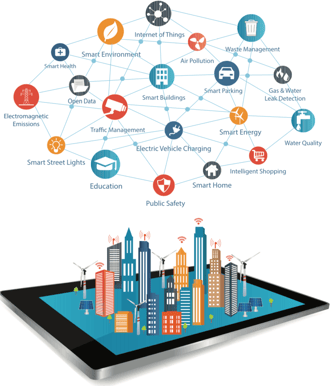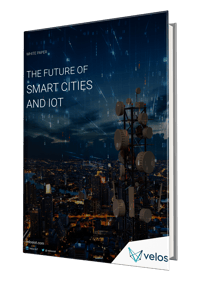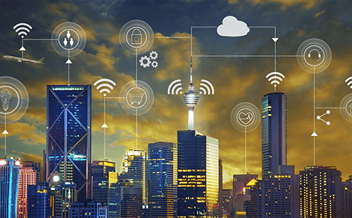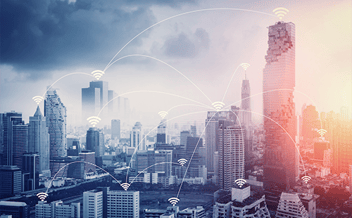

What to consider when choosing an IoT platform for Smart Cities?
When considering the term “Internet of Things”, one might initially perceive it as a vague concept rather than a concrete reality. This term encompasses a wide range of devices that connect to the internet, spanning from coffee makers to traffic lights.
According to Statista, it is projected that by 2030, there will be nearly 30 billion connected devices worldwide. To grasp the concept of IoT, one can observe how cities like Toronto and Barcelona are leveraging IoT connectivity to enhance the quality of life for their residents.
Since 2012, Barcelona has deployed connected devices across their urban systems, from waste management to public transit, to create a "network of networks"; which has increased yearly revenue by about $100 million. For example, through smart lighting, the city reports saving an additional $37 million annually. Overall, IoT systems have helped save $58 million on water, increased parking revenues by $50 million per year, and generated 47,000 new jobs.
Toronto's ambitious plan to transform part of their waterfront into a Smart City has continued to be built over the past few years, despite being met with some scepticism from privacy critics. While IoT platforms allow data sets to be built and acted upon based on specific needs, it’s important that your Smart City be designed in a way that enables the system to take advantage of the data you’ve collected.
With that in mind, here are the three key questions that any city planner should ask themselves (and their board) when considering adopting a smart city IoT platform.
How does the API function?
APIs serve as the digital glue that seamlessly binds together the diverse software systems and devices within a Smart City ecosystem. When considering the design and implementation of an IoT platform for a Smart City, the interoperability and integration capabilities of the API become paramount.
In the intricate web of a Smart City, software components and APIs act as the nerve centre, orchestrating the harmonious interaction between various hardware elements. Picture a scenario where your parking garage is connected to the network but lacks the ability to communicate with the electrical grid for optimised power usage – such a disconnect would undermine the very essence of a Smart City's efficiency and functionality.
In the dynamic landscape of a Smart City, a multitude of hardware and software components converge, each reliant on a robust API infrastructure to ensure the seamless flow of data that underpins the delivery of essential city services. The API serves as the linchpin that enables the smooth exchange of information between disparate systems, fostering a cohesive and interconnected Smart City environment where data-driven insights drive informed decision-making and enhance overall urban liveability.
 Can the smart city scale with one single IoT Platform?
Can the smart city scale with one single IoT Platform?
In a rapidly advancing digital age, the interconnectedness of various networks within a Smart City is paramount to its success. A city with disparate and isolated systems that fail to communicate effectively hinders its potential for growth and innovation. Conversely, when these networks interact seamlessly, it paves the way for a sophisticated and intricate IT environment that not only benefits cities today but also lays the foundation for the evolving city ecosystems of the future.
One of the fundamental questions that every Smart City must address is how to ensure that a data-driven solution implemented in one city can be easily adapted and replicated in another. This involves a meticulous examination of each program, considering factors such as scalability, compatibility, and operational efficiency. By delving into queries like the platform's capacity to manage multiple SIMs simultaneously and its ability to maintain effectiveness during business expansion, cities can proactively plan for sustainable growth and development.
Is the chosen IoT platform secure?
At the heart of every Smart City lies the crucial ability to securely exchange data between public and private entities. As cities embrace IoT networks, it is imperative to conduct thorough cybersecurity testing on new devices before integration. Safeguarding against vulnerabilities is essential to prevent one compromised node from jeopardizing the entire network of interconnected systems. Prioritising questions surrounding data security and secure data sharing during network implementation can mitigate potential risks and ensure the integrity of the Smart City infrastructure.
Is the smart city ecosystem usable?
When constructing a Smart City, it's essential to consider the residents who inhabit it. Each individual leads a unique existence with distinct schedules, responsibilities, and aspirations. While it may not be feasible to tailor a system to suit every person perfectly, it should, at the very least, be user-friendly.
By conducting regular evaluations, tests, and overseeing the ecosystem from the viewpoints of both the creators and users, you can uphold a comprehensive understanding of your IoT network.
To conclude
Selecting the appropriate IoT platform for a Smart City is paramount for a successful implementation. Navigating the decision-making process can be intricate, but by carefully considering these essential factors, you pave the way for seamless, dependable, and secure connectivity to drive the cities of the future.
For further insights on this topic, delve into our comprehensive white paper on the Future of Smart Cities and IoT. It explores key areas such as: 
- IoT's role in smart city connectivity
- Smart city use cases
- NB-IoT and other LPWAN technologies
- IoT platforms for smart cities
- How Velos IoT can give smart cities an edge
Speak to a Velos IoT expert
Related articles


How the Internet of Things (IoT) is transforming Smart Cities
The idea of the "Smart City," is something we've been dreaming of since the days of The Jetsons and...

How Velos IoT can give your Smart City an edge in IoT
Velos IoT is leading the telecom and connectivity industry forward by adapting to the latest trends...
